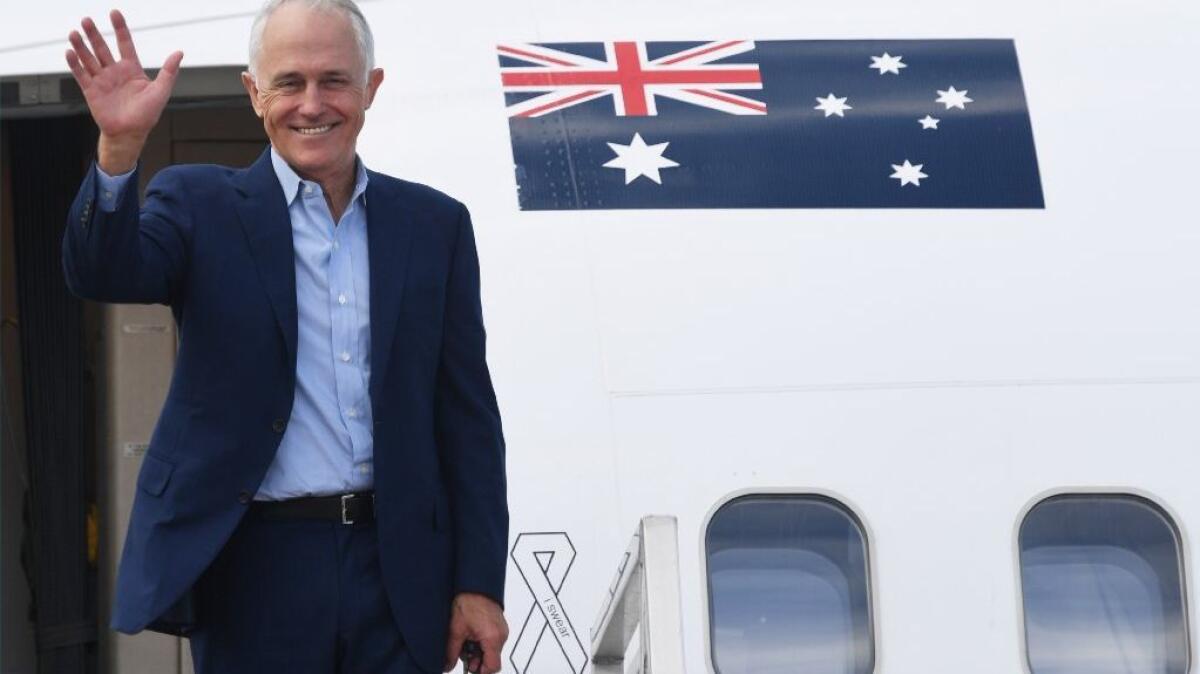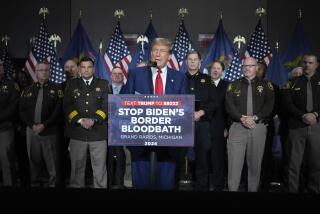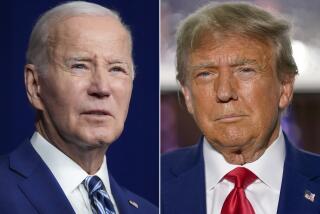Australia and U.S. work to repair relationship after early Trump thrashing

President Trump was still settling into the Oval Office early last year when he blasted Australian Prime Minister Malcolm Turnbull over the phone for what the president called the “worst deal ever.”
At issue was then-President Obama’s agreement to accept about 1,250 refugees who had fled to Australia, mostly from Myanmar, Afghanistan and Pakistan. Taking them, Trump argued, would contradict his vow to ban people arriving from a series of Muslim-majority countries, and to suspend the U.S. intake of refugees.
For the record:
9:45 a.m. Feb. 23, 2018An earlier version of this article described the agreement to transfer about 1,250 refugees from Australia to the U.S. as including “economic refugees.” In a phone call with President Trump last year, Australian Prime Minister Malcolm Turnbull repeatedly described the group in those terms. Under U.S. law, refugees must demonstrate they have been persecuted, or have reason to fear persecution, on the basis of race, religion, nationality, political opinion, or membership in a particular social group. U.S. law does not recognize economic refugees.
“I look like a dope,” Trump told Turnbull, according to a transcript of the contentious call that was leaked to the Washington Post in August. “This is going to kill me. I am the world’s greatest person that does not want to let people into the country.… It makes me look so bad, and I have only been here a week.”
With Turnbull scheduled to visit the White House on Friday, the Trump administration has accepted up to 170 of the refugees, and others are under consideration, according to the State Department. Twenty-two arrived in Los Angeles last week, according to the Refugee Action Coalition, based in Sydney.
In exchange, Australia has agreed to take a number of immigrants fleeing violent countries such as El Salvador and Honduras.
The long-delayed refugee swap has complicated U.S. ties with Australia, long one of America’s staunchest allies, and both countries are eager to get relations back on an even keel. Trump finally nominated an ambassador to Canberra this month, selecting Adm. Harry B. Harris Jr., who is finishing up a three-year assignment as head of U.S. Pacific Command.
“Mates stick by each other through good times and bad,” Turnbull wrote in an op-ed for USA Today before his arrival. “Mates have each other’s backs.”
Trade is another point of contention. Australia condemned Trump’s decision last year to withdraw from the proposed 11-nation Trans-Pacific Partnership trade deal, which the Obama administration had negotiated in an effort to help constrain China’s growing power.
Turnbull is bringing 20 Australian business entrepreneurs, and they will lobby U.S. governors and lawmakers to build pressure for a return to the TPP, said Joe Hockey, Australia’s ambassador in Washington. Turnbull will personally make the case when he addresses the National Governors Assn. winter conference this weekend in Washington.
“I don’t think a lecture from Australia about free trade is going to change [Trump’s] mind but there needs to be a buy-in from … so many small businesses and communities across the United States who are beneficiaries,” Hockey said.
Trump and Turnbull also are expected to discuss the president’s recent announcement of tariffs on imported steel and aluminum, international efforts to isolate nuclear-armed North Korea, and expansion of the “Indo-Pacific” alliance that seeks to counterbalance China.
“The prime minister and the president are actually quite close and they respect each other,” Hockey told reporters in a conference call. “Our prime minister understands New York very well, they share a common transactional business language.… The combined interests of both countries [weigh] more than the minor differences they might have.”
Trump got off to a rocky start with Turnbull, a former Goldman Sachs executive with a strong pro-business bent.
In their tense phone conversation on Jan. 28, 2017, Trump told Turnbull it was the “most unpleasant” call he had made that day. “Putin was a pleasant call. This is ridiculous,” Trump said, referring to the Russian President Vladimir Putin.
He repeatedly pushed back on the refugee agreement, complaining that Australia was dumping its refugees on the U.S., and warning that some could become terrorists.
“I hate taking these people,” he said. “I guarantee you they are bad.”
Turnbull countered that the U.S. obviously should vet anyone it accepted, and thus would not have to take all 1,250, who were in detention camps on islands off Australia. They could not be moved into Australia, he said, because a law blocked refugees from arriving by boat, an effort to stem human smuggling.
The call came a day after the Trump administration had announced a travel ban on people from seven mostly Muslim countries, including refugees, a policy that sparked turmoil at airports and multiple court challenges.
Trump and Turnbull met in May in New York at a ceremony commemorating the Battle of the Coral Sea, a major naval engagement in World War II. The two leaders appeared to bury any disagreements.
Secretary of State Rex Tillerson, and Defense Secretary James N. Mattis were dispatched to Australia the following month to ease tensions and restore normal relations.
Turnbull later appeared to mock Trump at an Australian press event known for roasting and humor. A video showed Turnbull boasting that he and Trump were “winning and winning.”
“We are winning so much,” Turnbull, who has seen his popularity plummet in Australian opinion polls, said to peals of laughter, “we are winning like we have never won before.”
U.S. officials dismissed the jibe as good-natured fun.
For more on international affairs, follow @TracyKWilkinson on Twitter
More to Read
Start your day right
Sign up for Essential California for news, features and recommendations from the L.A. Times and beyond in your inbox six days a week.
You may occasionally receive promotional content from the Los Angeles Times.






